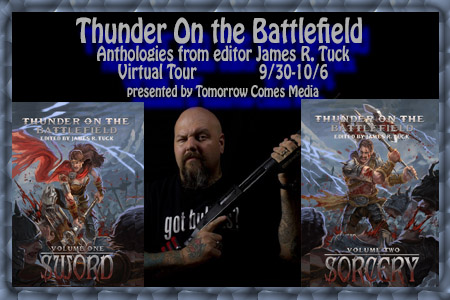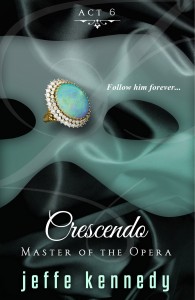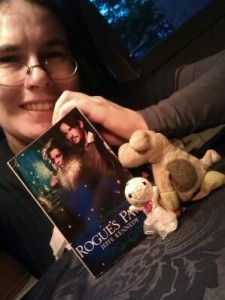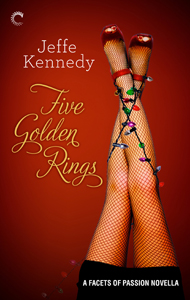 I’m over at the Contemporary Romance Cafe today, musing about genre conventions and wondering what makes a book like my next week’s release, Rogue’s Possession, a fantasy romance instead of contemporary romance. Is it only setting?
I’m over at the Contemporary Romance Cafe today, musing about genre conventions and wondering what makes a book like my next week’s release, Rogue’s Possession, a fantasy romance instead of contemporary romance. Is it only setting?
RITA ® Award-Winning Author of Fantasy Romance
 I’m over at the Contemporary Romance Cafe today, musing about genre conventions and wondering what makes a book like my next week’s release, Rogue’s Possession, a fantasy romance instead of contemporary romance. Is it only setting?
I’m over at the Contemporary Romance Cafe today, musing about genre conventions and wondering what makes a book like my next week’s release, Rogue’s Possession, a fantasy romance instead of contemporary romance. Is it only setting?
 Several fun things going on today.
Several fun things going on today.
If you dash over to the Here Be Magic blog, you can participate in our first ever Win-A-Book Wednesday, and possibly win a free book from me! This will be a regular weekly feature from us – I just happen to be first.
I’m thrilled to see Rogue’s Possession listed by The Bookpushers as an October Must Have. I’m particularly thrilled by the company – Lauren Dane, Mercedes Lackey, Meljean Brook and Nalini Singh, among others!
Finally, Total Eclipse Reviews interviewed Rogue today, with more or less success.
 The lovely Sheila Deeth is hosting me over at her blog today, where we’re talking about my Twelve Kingdoms story, Negotiation. Come on over!
The lovely Sheila Deeth is hosting me over at her blog today, where we’re talking about my Twelve Kingdoms story, Negotiation. Come on over!

 My editor at Kensington, Peter Senftleben, asked me to draw a map of my world in the Twelve Kingdoms trilogy. This is what I plan to mail him tomorrow. In a poster tube, because it’s big! Though I hadn’t drawn anything in a really long time (20 years? More?), I enjoyed doing this more than I thought I would.
My editor at Kensington, Peter Senftleben, asked me to draw a map of my world in the Twelve Kingdoms trilogy. This is what I plan to mail him tomorrow. In a poster tube, because it’s big! Though I hadn’t drawn anything in a really long time (20 years? More?), I enjoyed doing this more than I thought I would.
However, I also plan to tell him that, if they want to have a real illustrator redo it, my feelings won’t be at all hurt.
So, this week’s topic in the Word Whores bordello is – *rummages around in the purple pimp hat we store topics in* – Basing Characters on real-life people: the dangers and advantages. Hie on over yonder, to read more.
 You all know I’m a Starbucks fan.
You all know I’m a Starbucks fan.
If you don’t, you just haven’t been reading. Which is fine! But, you know, it’s in the standard Facts About Jeffe.
And yeah, yeah, yeah – I’ve heard the whole song and dance about corporate coffee and how, eyew, Starbucks coffee tastes burnt and I should support local coffee shops. The thing is, I go to local coffee shops and 1) chances are it will take forever to get my beverage, 2) it’s a total crapshoot what it will taste like and what kind of caffeine impact it will have. These things are important to me. I like that roasted Starbucks flavor, because it tastes great in my lattes, which I can depend on being just the way I like them, because I order them that way. You might laugh on the caffeine impact, but I’m a sensitive flower – there’s a fine line for me between “rev-me-up” and “omfg-my-heart-is-going-to-burst.”
Beyond that, I can count on Starbucks – really any Starbucks – being fast, efficient and offering a friendly atmosphere. I like their corporate policies and that they treat their employees decently.
So, not long ago, David and I flew into Albuquerque early in the morning and were driving home up to Santa Fe. We wanted coffee! so I used my phone to find the nearest Starbucks, of course. We went to the one at 3400 Central Ave SE, which is in the “Nob Hill” part of town. The building looked kind of funky, but I couldn’t place it. That’s a pic of it above, from Google Street View, so it’s kind of sucky. I should have snapped a pic, but I didn’t think to at the time.
It’s even better inside, with that arched barn roof and a cozy fireplace. And that odd sense of childhood familiarity.
I asked – and the building is a refurbished Arby’s. Yeah – you can see it, right? That old Arby’s architecture.
I love that they did this.
See, for a long time (20+) years, I lived in a town in Wyoming plagued by the Abandoned Building Syndrome. They’re a true blight on any community. Our town had a Walmart – an enormous warehouse that was abandoned when Those Who Did Not Care About Our Community decided to build a SUPER Walmart a quarter-mile away. Because, for them, it was less expensive to purchase new land and construct the even huger warehouse. That parking lot became the brightest point in town, by far – the first light visible flying in at night. Meanwhile, the old building moldered, adding its sorrowful tale to the decrepit former Long John Silvers just up the road, which hosted various Chinese restaurants until it ungracefully fell completely to pieces.
So, this is one more reason for me to love Starbucks – that they repurpose these old buildings. I’m a big fan of reusing what we already have. I even contributed an essay to an anthology once, called “Home Recycling,” about why I like buying older houses.
Thus, if you’re ever in and around Albuquerque, stop by the Starbucks in Nob Hill and take in that rehabbed Arby’s ambience. It’s really quite awesome – both aesthetically and energetically.
~Toasts with Pumpkin Spice Latte~
 The lovely Lynda Ryba of the Fish with Sticks review blog interviewed me and some other wonderful authors about Banned Books Week. The post is over on the Wicked Little Pixie blog, so go check it out!
The lovely Lynda Ryba of the Fish with Sticks review blog interviewed me and some other wonderful authors about Banned Books Week. The post is over on the Wicked Little Pixie blog, so go check it out!
 Here’s the cover for the sixth and final episode of my Master of the Opera e-Serial. The first one comes out January 2 and the series finishes with this one, on March 20. What’s cool to me about this cover is the opal ring. It’s EXACTLY how I described it in the story, which is just way cool to see. You can see about all of them here.
Here’s the cover for the sixth and final episode of my Master of the Opera e-Serial. The first one comes out January 2 and the series finishes with this one, on March 20. What’s cool to me about this cover is the opal ring. It’s EXACTLY how I described it in the story, which is just way cool to see. You can see about all of them here.
So, this is Ask the Readers week in the bordello – where we ask you all those questions we *really* wonder about. Imagine yourselves up on the panel at the front of the room and we’re sitting in those crowded-too-close conference chairs.
 Love this photo from Carien, Sullivan McPig and Voodoo Bride – all hugging on their copy of Rogue’s Pawn. I might not have visited The Netherlands, but my books have!
Love this photo from Carien, Sullivan McPig and Voodoo Bride – all hugging on their copy of Rogue’s Pawn. I might not have visited The Netherlands, but my books have!
Many of you know I lived in Wyoming for a long time. I went there for graduate school, fell in love with David and ended up staying more than 20 years. Wyoming is an interesting place to live, landlocked in the middle of the country, with the smallest population of all the states. A lot of it is beautiful and a lot isn’t. But the people who live there have a fierce pride of place. There’s a certain mystique to being a resident, to combatting the ferocious winters and going without the luxuries other communities enjoy. It’s tied in with the Western Myth, the hero as a cowboy, the rugged loner and frontiersman.
When I met David – a Wyoming man, born and bred – he would sometimes comment contemptuously about the “Wyoming Wannabes,” the people who moved there wanting to be part of the mystique. There were people like this, who left the big cities and came to Wyoming thinking they’d become the Malboro Man. One writer friend pointed out that it was the only place she’d ever lived where people identified themselves by how long they’d lived there. She was right – everybody knew their length of residency and offered it up as their Wyoming cred, the longer, the better.
And, if you hadn’t been born there, it didn’t matter how long you’d lived there – you were never a “real” resident.
I think of this when I hear someone complain about another “mining a cultural tradition.” It’s this idea that a culture – or a place or a myth or mystique – is somehow the exclusive property of one group of people. On a panel I moderated at World Fantasy Con in 2012, the Australian author Sean Williams spoke at some length of being very aware of not inadvertently mining the aboriginal culture for stories or mythology in any way. I read much of this same criticism (among heaps of others) about Miley Cyrus’ performance at the Grammys this year, and how she was appropriating black culture.
It seems to be this sense that a minority or oppressed group has something precious, that should not be stolen by an imperialist culture.
What bothers me is, who decides what’s part of human culture or a place that anyone can enjoy and what belongs to only one group?
When I was a teen, I once told some family friends that I didn’t feel much patriotism for the United States as a whole, but that if my hometown of Denver was attacked, I’d fight to defend it. They were very interested in that and said they wondered if it was because I hadn’t lived much of anywhere else or traveled much. In many ways, they were right – as I’ve grown older and lived more places, my sense of the world has grown much broader. Many places are special to me now. I think about this in science fiction stories sometimes, that a day will come when we’ll identify as being “from Earth,” not just one city, state, or country, but the whole planet.
From that perspective, isn’t human culture all one culture?
I confess that it bothers me that, as a storyteller, I’m to keep my thoughts out of some mythologies. That they somehow belong to someone else, as their exclusive property. I suppose I believe that shared racial memory means among all human beings, not just the Irish/Scot/French/Dutch melange I can genetically lay claim to.
So, I’m curious to know what you all think. Is there a line that shouldn’t be crossed? And, if there is, how and where should it be drawn?
